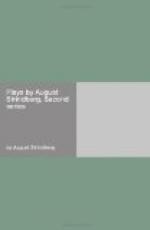There are two distinct currents discernible in this dramatic revelation of progress from spiritual chaos to spiritual order— for to order the play must be said to lead, and progress is implied in its onward movement, if there be anything at all in our growing modern conviction that any vital faith is better than none at all. One of the currents in question refers to the means rather than the end, to the road rather than the goal. It brings us back to those uncanny soul-adventures by which Strindberg himself won his way to the “full, rock-firm Certitude” of which the play in its entirety is the first tangible expression. The elements entering into this current are not only mystical, but occult. They are derived in part from Swedenborg, and in part from that picturesque French dreamer who signs himself “Sar Peladan”; but mostly they have sprung out of Strindberg’s own experiences in moments of abnormal tension.
What happened, or seemed to happen, to himself at Paris in 1895, and what he later described with such bewildering exactitude in his “Inferno” and “Legends,” all this is here presented in dramatic form, but a little toned down, both to suit the needs of the stage and the calmer mood of the author. Coincidence is law. It is the finger-point of Providence, the signal to man that he must beware. Mystery is the gospel: the secret knitting of man to man, of fact to fact, deep beneath the surface of visible and audible existence. Few writers could take us into such a realm of probable impossibilities and possible improbabilities without losing all claim to serious consideration. If Strindberg has thus ventured to our gain and no loss of his own, his success can be explained only by the presence in the play of that second, parallel current of thought and feeling.
This deeper current is as simple as the one nearer the surface is fantastic. It is the manifestation of that “rock-firm Certitude” to which I have already referred. And nothing will bring us nearer to it than Strindberg’s own confession of faith, given in his “Speeches to the Swedish Nation” two years ago. In that pamphlet there is a chapter headed “Religion,” in which occurs this passage: “Since 1896 I have been calling myself a Christian. I am not a Catholic, and have never been, but during a stay of seven years in Catholic countries and among Catholic relatives, I discovered that the difference between Catholic and Protestant tenets is either none at all, or else wholly superficial, and that the division which once occurred was merely political or else concerned with theological problems not fundamentally germane to the religion itself. A registered Protestant I am and will remain, but I can hardly be called orthodox or evangelistic, but come nearest to being a Swedenborgian. I use my Bible Christianity internally and privately to tame my somewhat decivilized nature— decivilised by that veterinary philosophy and animal science (Darwinism) in which, as student at the university, I was reared. And I assure my fellow-beings that they have no right to complain because, according to my ability, I practise the Christian teachings. For only through religion, or the hope of something better, and the recognition of the innermost meaning of life as that of an ordeal, a school, or perhaps a penitentiary, will it be possible to bear the burden of life with sufficient resignation.”




